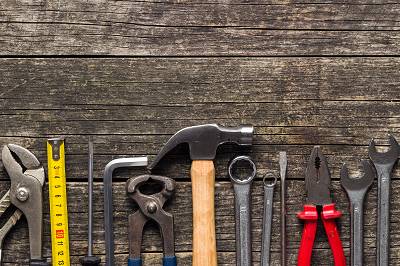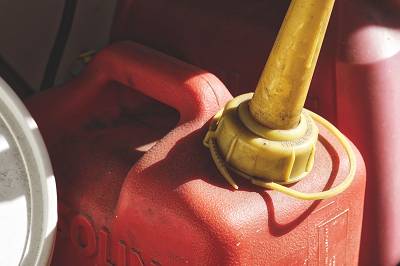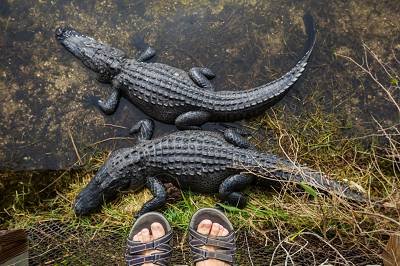Scavenging is something that comes up a lot in discussions about what people will need to do to survive.
I want to start off by addressing something that I know is going to come up regarding scavenging. More than one person reading this article is going to want to lecture me and everyone else on how stealing is wrong. I agree with them 100% on this. At the same time during a collapse, there is a high likelihood that you will have to do a lot of hard things if you don’t want to suffer a lot, die, or watch your loved ones suffer and succumb as well.
Ultimately it is up to you what path you let your morality lead you down during a collapse. I will say that those that are willing to accept the new reality and do some things that they normally would not, will have a much higher chance of surviving during a long event. There are some people out there that would rather die than do some things or they will give until it hurts.
To each their own.
During war and/or collapse, things get abandoned and there is also the simple fact that at some point, there is no way that you not scavenging is going to be helpful to anyone except others that are going to come along and scavenge.
Some of the items that I am going to suggest that you look for are not what the typical looter you see on TV after a natural disaster is going for but a lot of them are far different.
Before and during any collapse, it is important to be honest about the psychology of the population. What is the average person most used to and what is most comforting? This will give you an idea of what they are going to go after first.
Metal:
This is a big category because there are so many useful metals. Aluminum, copper, and sheet metal of all descriptions can be utilized for many different purposes.
Power Supplies:
AA and AAA Batteries:
 AA and AAA batteries are the most common. With so many devices using USB charging, people keep less batteries around their homes than they used to. If this sounds like you then I recommend getting a device that allows you to put batteries in it and charge via USB or have a small solar charger that acts as a battery bank.
AA and AAA batteries are the most common. With so many devices using USB charging, people keep less batteries around their homes than they used to. If this sounds like you then I recommend getting a device that allows you to put batteries in it and charge via USB or have a small solar charger that acts as a battery bank.
Having a solar battery charger will allow you to utilize batteries for longer than other people. When you scavenge, look for devices that take batteries. Even if the device doesn’t work, the batteries inside may still be good. Even if they are not rechargeable they may still have some power left in them.
Solar Panels and Supplies:
A lot of the grid-tie systems in the United States that you see on roofs are panels that operate at 37 volts. Without an MPPT style charge controller, these cannot be scavenged and used. The solar panels that are used at solar farms have a voltage that requires MPPT charge controllers as well.
MPPT charge controllers are the more expensive ones. They are hundreds of dollars. A charge controller that can deal with a real 12V panel can be had for $20 and up.
Car Batteries:
These have a lot of power in them. If you have a solar system set up already or are scavenging supplies to put one together, then some car batteries will allow you to have extra power stored. Car batteries are heavy so you might want to find a shopping car or throw together a wagon to haul them in. The newer the battery the better. Car batteries have a date on them. Try to scavenge batteries that are less than 5 years old for best results.
Food:
While food is something that will be scarce the most quickly, you would be surprised how some of the foods that require some preparation will get left behind first. You will do better if you are the person that knows they should grab the grits rather than the single box of cookies.
Seeds:
 I am going to go ahead and say that in urban areas, if there are seeds on the shelf, or laying around, a lot of people are not going to see them as something they should get immediately. While during a collapse people do grow food in urban areas, it is often further into the collapse that they realize that growing food is part of their new reality. Even if you are not in a position to grow food right away, there may be a time when those seeds can make a big difference in your life and that of your family.
I am going to go ahead and say that in urban areas, if there are seeds on the shelf, or laying around, a lot of people are not going to see them as something they should get immediately. While during a collapse people do grow food in urban areas, it is often further into the collapse that they realize that growing food is part of their new reality. Even if you are not in a position to grow food right away, there may be a time when those seeds can make a big difference in your life and that of your family.
Water:
Water Catchment Supplies:
 When surface water is contaminated or simply not available nearby, water catchment can save your life. It can allow you to stay in place rather than going to places where you are most likely to run into other people or those that wish you harm. Here is a shortlist of the basics you should look for.
When surface water is contaminated or simply not available nearby, water catchment can save your life. It can allow you to stay in place rather than going to places where you are most likely to run into other people or those that wish you harm. Here is a shortlist of the basics you should look for.
- Tarps
- Guttering
- Sheet metal
- Buckets
- Barrels
- Jugs
- Tubing
- Silicone caulking and food-safe glues
- Spickets and spouts
Water Filtration and Disinfection Supplies:
 Of course, it is best to have some premade water filters on hand for any short or long emergency. At the same time, you should consider what supplies could be utilized to help with water filtration and disinfection if those are not available. Here are some items.
Of course, it is best to have some premade water filters on hand for any short or long emergency. At the same time, you should consider what supplies could be utilized to help with water filtration and disinfection if those are not available. Here are some items.
- Regular bleach with no scents added. You would be amazed at how much a lot of people hate bleach. While I don’t like to use it either, it is excellent for sanitizing water and other things during an emergency.
- Iodine solution. Again not my choice for drinking water. You have to let your water set for 30 minutes or more before drinking. At the same time, iodine is something a lot of people are going to overlook if they are scavenging because they don’t understand how useful it really is for water and medical use.
- White cloth or cheesecloth for prefiltering. Old white t-shirts can be cleaned even if dirty and used to prefilter water that has a lot of particulates.
Clothing and Blankets:
There is a lot of clothing in the USA. Our second-hand shops are overflowing. A lot of people don’t wear out their clothing, but donate it or pass it on when they want something more fashionable. Clothing will be more valuable in hard times.
Blankets are important because it is harder to stay warm without modern heating methods being available. Blankets that are made of synthetic materials have some advantages over cotton and wool blankets will provide the most warmth under harsh conditions.
Shoes:
You might be thinking that it is going to be hard to find shoes that are your size or the size of anyone in your group at times. While this may be true, it is important to remember that socks, padding, and insoles can be combined to make larger shoes a better fit. Shoes are also something that can be given freely or traded if you want to help out someone that happens your way.
Rethink how you scavenge. Here are some questions to ask.
What do I need to make something else I need?
The hipsters sometimes call this upcycling. This is the art of taking something and repurposing it. Of course, during a collapse, you need to be thinking about what components you need to put together a lot of items and systems to get by.
Blankets can be used as a fabric source and sewn into clothing or made into a poncho by cutting a hole.
Tarps can be utilized for water catchment or to keep items dry. They are also useful for temporary fixes to roofs.
Medical Supplies:
 At the beginning of a collapse in a well off country, medical supplies will not be the first priority of many. Unfortunately for them, they will not think of this until they realize that professional medical care is not easy to come by. Think about how we are encouraged to go to the doctor for every small incident or illness. That is a hard mindset for a lot of people to overcome.
At the beginning of a collapse in a well off country, medical supplies will not be the first priority of many. Unfortunately for them, they will not think of this until they realize that professional medical care is not easy to come by. Think about how we are encouraged to go to the doctor for every small incident or illness. That is a hard mindset for a lot of people to overcome.
Any medical supply will have value if not too damaged or dirty. Medicine cabinets and under bathroom sinks are good places to look in abandoned buildings and homes. Sometimes offices have medical kits placed throughout a building or in employee dining and rest areas. Commercial vehicles may have them in cargo and storage areas.
Soap and Cleaners:
 Any type of soap or cleaner is going to help things stay more hygienic. Soap is something that we take for granted as always being there. Indeed our ancestors made their own and I could see that happening again after a certain stage of collapse has passed but that is going to take some time. It is amazing how fast people get dirty and conditions become unsanitary after even a small disaster. As a survivor of many floods, I can say first hand that it is extremely disgusting during and especially afterward.
Any type of soap or cleaner is going to help things stay more hygienic. Soap is something that we take for granted as always being there. Indeed our ancestors made their own and I could see that happening again after a certain stage of collapse has passed but that is going to take some time. It is amazing how fast people get dirty and conditions become unsanitary after even a small disaster. As a survivor of many floods, I can say first hand that it is extremely disgusting during and especially afterward.
Items that can be used for defense:
This is an area where you can get really creative. For example what about sharpening pieces of metal? Here are a few things I can easily think of for weapons and defense.
- Kitchen cutlery. Even a butter knife can be sharpened into something deadly.
- Glass bottles. These can be broken and the shards used for defensive barriers. Molotovs are not really an option in a major collapse because everyone is going to want to save whatever fuel they can for other tasks.
- Boards that have usable sections can be used for barricading or reinforcing weak points of exteriors.
Hand Tools:
 When electricity is not easy to come by and you have to fix things yourself, any hand tool is going to be handy to have. Sometimes just having the right tools for a job can make you a very valuable person to have around and even help keep you safe. If you have skills on top of having tools then you are even further ahead of the game. Just look at the example of Jose’s father in Venezuela. He has the tools and knowledge to perform electrician services and this has helped his family survive during a collapse.
When electricity is not easy to come by and you have to fix things yourself, any hand tool is going to be handy to have. Sometimes just having the right tools for a job can make you a very valuable person to have around and even help keep you safe. If you have skills on top of having tools then you are even further ahead of the game. Just look at the example of Jose’s father in Venezuela. He has the tools and knowledge to perform electrician services and this has helped his family survive during a collapse.
- Rakes
- Shovels
- Hoes
- Pruners
- Hammers
- Screw Drivers
- Axes and Mauls
- Flat bar
- Crow Bar or Pry Bar
Fasteners:
 Some people will not realize just how important it is to be able to put two things together until they go through something like a collapse. Here are a few things to scavenge.
Some people will not realize just how important it is to be able to put two things together until they go through something like a collapse. Here are a few things to scavenge.
- Screws
- Bolts and Nuts
- Nails
- Bracing to be used with nails and screws. You can make your own out of sheet metal or scavenged metal if necessary.
Communications:
Paper, pencil, and pen are going to be more commonly used as a means of communication during a collapse. Old offices and stores are a potential source. Do keep in mind that there is not as much paper used in today’s technological age so paper products may actually be harder to find during a collapse than you might think.
Radios and other equipment may be found more readily in some areas than others. For example, a security company that has been partially destroyed may have something useful for communications that you might be able to scavenge. In the city, a lot of larger buildings have security offices. After a collapse and abandonment, there may be something there that is useful.
Notes On Scavenging Gasoline:
 Some people may think that they can easily get gasoline from various vehicles or small engines. The answer is that it is not quite as simple as siphoning some gas. Here are a few things that are important to keep in mind when making the choice to scavenge fuel for use in motors.
Some people may think that they can easily get gasoline from various vehicles or small engines. The answer is that it is not quite as simple as siphoning some gas. Here are a few things that are important to keep in mind when making the choice to scavenge fuel for use in motors.
- If a vehicle wasn’t made before the mid-90s, they likely have a gas tank shaped so that siphoning is not possible. This is a safety feature to prevent gas from running out of the vehicle in the event of a rollover. Only a few heavy-duty trucks built in modern times lack this feature.
- Old fuel can damage a good motor. If a machine has been setting for a long time, chances are the gas is bad and may cause you a lot of trouble if you try to use it.
- Old fuel can be rehabilitated using products such as water remover and octane booster. If you want to be able to make use of old fuel during an emergency, it is a good idea to put some back.
- At around 6 months post-collapse, any gas you find is likely going to be pretty bad.
- Remember that gas that is in cans in barns, in weed eaters, lawnmowers, etc was closer to being bad at the time of collapse than other fuels because it has been stored longer.
If you must get gasoline out of a modern vehicle, the easiest way is to locate the tank and put a hole in it to drain out the gas. Of course, this will ruin the gas tank. It is safest to do this with a plastic gas tank. If the tank is metal, you have to be very careful. The metal is thick and you would not want to use any tool that could create sparks or heat such as a cordless power drill. Metal tanks are a lot rarer than they used to be. Most modern vehicles have plastic tanks to save on weight.
Other Fuels:
- Diesel fuel takes longer to go bad than gas, but it is used less often by the average person than gas.
- Kerosene has a long life as long as it does not get water in it. This is another case where having some water remover is a good idea.
Wood For Heat and Cooking:
 You might have read about people burning all kinds of things to stay warm or cook. I think it is important to point out some safety rules for finding wood to burn.
You might have read about people burning all kinds of things to stay warm or cook. I think it is important to point out some safety rules for finding wood to burn.
- Treated lumber used to be treated with arsenic. You do not want to burn treated timbers that are older. The modern treated boards use copper which is not near as harmful but still not ideal.
- Lead paint was in use up to the 1970s. Boards that are painted and from older buildings may have lead paint underneath the more modern paint.
- Wood that has poison ivy on it can cause major respiratory and skin issues if people come into contact with the smoke.
- Furniture is treated with wood finishes and preservatives.
Untreated and unpainted wood is always best. For long term use wood can be stacked and allowed to dry out further. I could see this scenario after a collapse if you were trying to prepare for the oncoming winter and had to scavenge wet or damp wood.
Camping and Survival Gear:
 There is a good chance that this stuff is going to be long gone or not available but you should still keep an eye out for it. Remember to use your best judgment too. Dirty sleeping bags and tents are best left. The last thing you want is to get lice or something worse.
There is a good chance that this stuff is going to be long gone or not available but you should still keep an eye out for it. Remember to use your best judgment too. Dirty sleeping bags and tents are best left. The last thing you want is to get lice or something worse.
- Sleeping bags.
- Emergency blankets.
- Dry bags.
- Backpacks.
- Firestarters.
- Tents.
- Sleeping pads.
Staying Safe When Scavenging:
In places where there are a lot of desperate people or groups, you need to be very careful. After collapse has progressed to a certain level, there will be less and less to scavenge. Some places may be very unsafe. The places that are harder to get to maybe safer to scavenge and search through than others. Here are a few things to remember and do if you want to stay safe.
If the prize seems too good to be true, be cautious or forget about it.
Using something desirable for bait is an old trick. If you are scavenging and see something great that has not been available or easy to get for a long time, be cautious. Look for things that are out of place and movement on the outside perimeters. In cities and towns, any building or high ground that looks down on where the desirable items are could harbor someone that wishes to do you harm or take what you have.
Look out for booby traps:
Lines can be clear and hard to see. Booby traps are a post-collapse reality. Sometimes, people, have things stashed or they are living somewhere and don’t want others around. Look for anything that looks like it was purposely placed. While people often take extra care to make it look like there is nothing like this, sometimes small things get overlooked. Tripwires are a common booby trap method. The veterans reading this and some of the kids raised by them may be more familiar with this type of trap than others.
Structural soundness is a major safety concern.
Buildings can become structurally unsound very fast. This process is sped up considerably if a building has experienced an impact, earthquake, etc. A lot of people do not realize just how fast a structure can fall into decay and become unsafe after the heating system ceases to function even if the pipes don’t burst. Dampness is a big issue in unheated buildings. Small holes can let in rain and vermin too.
Scavenging could take you into some bad places. The last thing you want to do is to fall through a floor, have a staircase collapse under you, etc.
Broken glass, nails sticking out, and other hazards need to watch out for. This is one reason why having good boots and gloves in your preps or finding them post-collapse, is very important.
 Wildlife can also be a big hazard. Even during good times, after a disaster, this is a big problem. Ask the folks in Florida and other parts of the deep South what it is like to find snakes and gators in your house after a flood or hurricane!
Wildlife can also be a big hazard. Even during good times, after a disaster, this is a big problem. Ask the folks in Florida and other parts of the deep South what it is like to find snakes and gators in your house after a flood or hurricane!
Consider who is best to send out for scavenging missions.
I know I repeat myself a lot with some of the safety concerns for job duties during a long emergency but that is because it is really important. Running around and scavenging may seem like fun but it is not a duty that is appropriate for everyone. You may have to act quickly, run, carry a lot of weight, etc. This is not a task for really young kids, disabled persons, or the elderly if it can be avoided.
Also, remember that those with compromised immune systems. Searching around in places where a lot of people have been or where sanitation is not the best can expose you to a lot of nasty things that can lead to infection and other illnesses. How serious of a risk it is depends on the circumstances of the collapse but these are things you need to consider.
